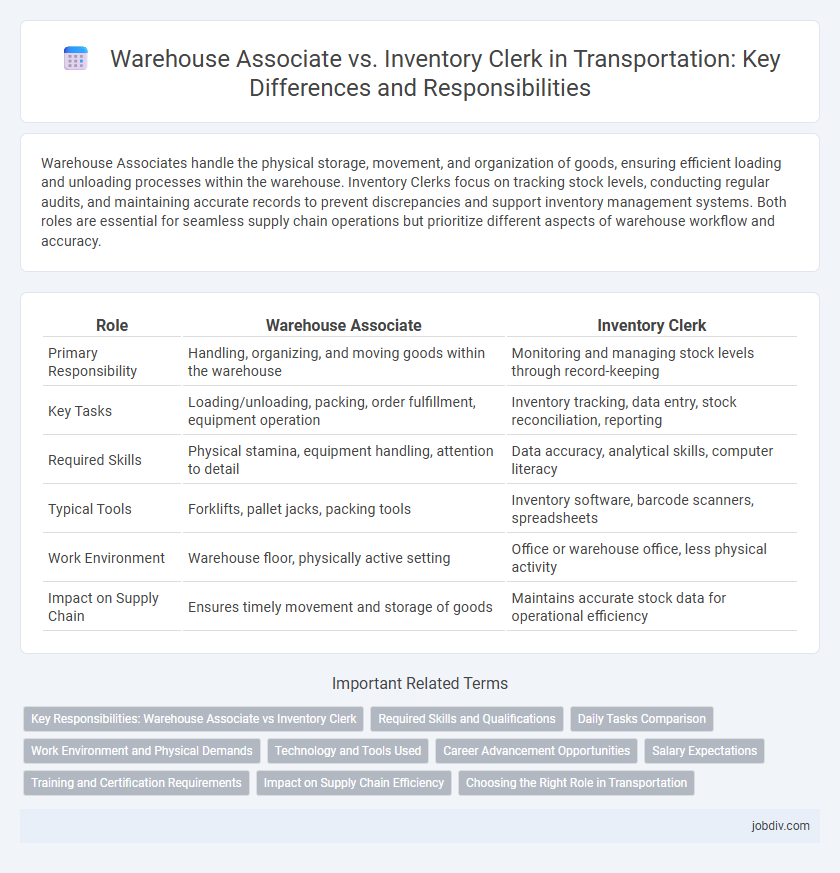Warehouse Associates handle the physical storage, movement, and organization of goods, ensuring efficient loading and unloading processes within the warehouse. Inventory Clerks focus on tracking stock levels, conducting regular audits, and maintaining accurate records to prevent discrepancies and support inventory management systems. Both roles are essential for seamless supply chain operations but prioritize different aspects of warehouse workflow and accuracy.
Table of Comparison
| Role | Warehouse Associate | Inventory Clerk |
|---|---|---|
| Primary Responsibility | Handling, organizing, and moving goods within the warehouse | Monitoring and managing stock levels through record-keeping |
| Key Tasks | Loading/unloading, packing, order fulfillment, equipment operation | Inventory tracking, data entry, stock reconciliation, reporting |
| Required Skills | Physical stamina, equipment handling, attention to detail | Data accuracy, analytical skills, computer literacy |
| Typical Tools | Forklifts, pallet jacks, packing tools | Inventory software, barcode scanners, spreadsheets |
| Work Environment | Warehouse floor, physically active setting | Office or warehouse office, less physical activity |
| Impact on Supply Chain | Ensures timely movement and storage of goods | Maintains accurate stock data for operational efficiency |
Key Responsibilities: Warehouse Associate vs Inventory Clerk
Warehouse Associates manage the receipt, storage, and shipment of goods, operating forklifts and organizing inventory to ensure efficient warehouse flow. Inventory Clerks focus on maintaining accurate stock records, conducting regular audits, and updating inventory management systems to prevent discrepancies. Both roles are critical in supply chain operations, with Warehouse Associates emphasizing physical handling and Inventory Clerks prioritizing data accuracy.
Required Skills and Qualifications
Warehouse Associates require strong physical stamina, attention to detail, and proficiency with warehouse management systems and forklifts. Inventory Clerks need advanced organizational skills, proficiency in inventory software, and the ability to analyze stock data accurately. Both roles demand effective communication skills and knowledge of safety protocols to ensure efficient supply chain operations.
Daily Tasks Comparison
Warehouse Associates primarily handle the physical movement, loading, and unloading of goods, ensuring accurate storage and retrieval within the warehouse. Inventory Clerks focus on managing stock records, conducting regular inventory audits, and updating databases to maintain accurate stock levels. Both roles play crucial parts in efficient supply chain operations by balancing hands-on logistics with meticulous record-keeping.
Work Environment and Physical Demands
Warehouse Associates typically work in fast-paced, physically demanding environments involving heavy lifting, packing, and operating forklifts in large storage facilities. Inventory Clerks primarily engage in tracking stock levels and performing data entry, often working in office settings adjacent to warehouses with less strenuous physical activity. Both roles require attention to detail and organizational skills, but Warehouse Associates face more rigorous physical demands and exposure to noise and moving equipment.
Technology and Tools Used
Warehouse Associates utilize advanced scanning devices, forklifts equipped with barcode readers, and warehouse management systems (WMS) to efficiently handle, move, and organize goods. Inventory Clerks rely heavily on inventory control software, handheld barcode scanners, and enterprise resource planning (ERP) tools to maintain accurate stock records and coordinate supply levels. Both roles leverage digital tools for real-time data tracking, but Warehouse Associates focus more on physical logistics technology while Inventory Clerks emphasize software-driven inventory accuracy.
Career Advancement Opportunities
Warehouse Associates develop hands-on skills in logistics and material handling, opening pathways to supervisory roles or specialized positions like forklift operation and shipping coordination. Inventory Clerks gain expertise in data management and inventory control systems, which can lead to advancements in supply chain analysis, procurement, or warehouse management. Both roles provide foundational experience with distinct career trajectories, with a Warehouse Associate often advancing through operational roles and an Inventory Clerk moving toward analytical or managerial positions in transportation and logistics.
Salary Expectations
Warehouse Associates typically earn an average salary ranging from $30,000 to $40,000 annually, depending on location and experience, while Inventory Clerks often command slightly higher pay, averaging between $35,000 and $45,000 per year due to their specialized skills in tracking and managing stock data. Salary expectations for both roles vary significantly based on geographic region, company size, and specific job responsibilities within the transportation sector. Employers in major logistics hubs tend to offer premium wages to attract Inventory Clerks who ensure accurate inventory control and Warehouse Associates who optimize material handling efficiency.
Training and Certification Requirements
Warehouse Associates typically require on-the-job training focusing on equipment operation and safety protocols, often supplemented by forklift certification. Inventory Clerks usually need formal training in inventory management systems and data entry, with certifications like Certified Inventory Specialist enhancing their credentials. Both roles benefit from OSHA safety training to ensure compliance with industry standards.
Impact on Supply Chain Efficiency
A Warehouse Associate directly influences supply chain efficiency by managing the physical handling, storage, and timely movement of goods, ensuring seamless order fulfillment and minimizing delays. An Inventory Clerk enhances accuracy in stock records, enabling precise demand forecasting and reducing stockouts or overstock situations that disrupt supply flow. Integrating both roles improves overall supply chain responsiveness and reduces operational bottlenecks.
Choosing the Right Role in Transportation
Warehouse Associates focus on the physical handling, sorting, and shipping of goods within a transportation hub, ensuring efficient movement and safety compliance. Inventory Clerks specialize in tracking stock levels, maintaining accurate records, and managing inventory databases crucial for supply chain accuracy. Choosing the right role depends on whether an individual prefers hands-on logistical operations or detailed inventory management to optimize transportation workflows.
Warehouse Associate vs Inventory Clerk Infographic

 jobdiv.com
jobdiv.com